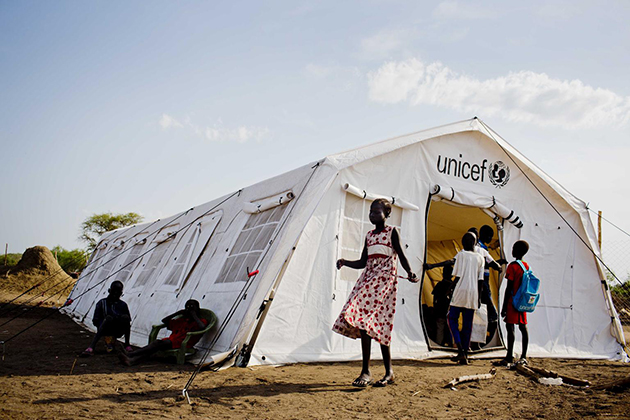
The effects of war, natural disasters, poverty, and other calamities on children often hit the headlines. The abduction of 200 schoolgirls by Boko Haram in Nigeria and surge of thousands of unaccompanied children from Central America into the U.S. are two recent examples.
Last week, the United Nations International Children’s Emergency Fund (UNICEF) released the largest-ever global study of the “staggering” physical and emotional violence inflicted on children daily, going beyond situations of conflict or war. The statistical analysis of violence against children, drawing on data collected from 190 countries, finds that sexual violence against girls under 20 is rampant; violence as a method of discipline within the home is widespread worldwide; and one in three students between the ages of 13 and 15 regularly face bullying in school.
UConn Today discussed some of these issues with Alaina Brenick, an assistant professor of human development and family studies. Her research has focused on children in high-conflict situations; immigration and the changing conceptions of self and identity in Israeli and Arab children; and the role of media in promoting or eliminating stereotypes. She is currently working on an analysis of interethnic relations between native Germans and minority immigrants in Germany.
Q. Have there been advances in the quality of the international humanitarian response to populations affected by conflict or natural disasters over the past 20 years?
A. Indeed, and we see those advances paralleled in the scientific literature as well. From a psychologist’s perspective, our work has historically focused on the rates of trauma, PTSD, depression, anxiety, etc. However, being psychologically healthy is much more than the mere absence of these diagnoses. Research has demonstrated the importance of factors like forgiveness, social support, and identity recognition in aid and reconciliation, and that has facilitated a holistic approach, including both psychological and social health. In short, we work not only on physically rebuilding communities, but also on psychologically rebuilding communities in ways that elicit respect and dignity.
Q. How can the mindsets that perpetuate violence be tackled?
A. In situations of war, when a group feels that its existence is psychologically or physically threatened, the group and its members are more likely to fall into discriminatory acts and prejudicial attitudes towards those who pose the threat. In extreme cases this can lead to dehumanization and demoralization of those not in our group – literally, denying individuals their humanity and morality. A number of approaches have focused on facilitating contact across groups to help learn about similarities and debunk extreme stereotypes – we’ve even used Sesame Street for this purpose with young children in the Mid-East – and promoting empathy and compassion across groups. These techniques help to promote coexistence and reduce threat and the associated violence.
Q. Are there studies being carried out to understand the needs of displaced people and how to help them overcome the effects of war and displacement?
A. First, I’d like to point out that disaster or displacement isn’t a one-time event. The events themselves can be ongoing, such as sustained conflict and war. In addition, the process of experiencing and reacting to these events is ongoing. Secondly, from work that I carried out with my colleagues in Colombia and the Mid-East, we know that from a young age, conflict-affected displaced children hold extremely negative views of those on the other side of the conflict, and they are more willing to engage in retaliatory behaviors. At the same time, we’ve found that these children are also highly supportive of reconciliation and moral concepts of fairness and equality. With age, their views can become hardened and act as a justification for continued violence. We know we need to work with children – as young as possible – and their families, schools, and communities to provide multifaceted prevention and intervention efforts, or else we just won’t see the lasting change we hope to facilitate.
Q. Is there growing agreement that the extent and impact of displacement needs to be better understood?
A. Without a doubt. There has been a growing understanding of the need to have culturally and contextually specific programs in place, guided by the local communities and our best scientific knowledge. Thankfully, there are awe-inspiring practitioners and researchers out there making sure that the voices of all affected individuals – youth, families, women, the elderly – are heard.
Q. The just-released UNICEF report paints a picture of endemic physical and emotional violence inflicted daily on children, often at home or at school and in peacetime rather than in situations of conflict or war. How can this sort of violence be tackled?
A. If we look at bullying in communities not affected by war and violence, we hear some people claiming that bullying is simply a part of growing up, it toughens up children. The difficulty with that line of reasoning is that bullying disproportionately affects children who are different from the norm – those who stick out because of their gender expression, their accent, their skin color, their personality. Children who experience bullying in school are much more likely to skip school and drop out, and that puts these children at a disadvantage throughout the rest of their lives. Also, recent research has shown that the brains of children respond the same way to social exclusion as they do to physical pain. We’ve found that early experiences of abuse and violence change our brains – our stress responses differ; we lose gray matter; our DNA ages prematurely. As research unveils more about bullying, our communities must become increasingly understanding of the need to protect children.
Brenick is taking part in a panel discussion on global efforts to help displaced children and families due to natural and human-made disasters on Wednesday, Sept. 10, at 4 p.m., at the Dodd Research Center. The panel is the first in a series of four events on campus this fall to mark the UN’s 20th anniversary of the International Year of the Family.


